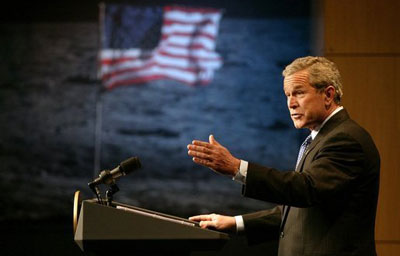The Bush space vision and America’s futureby Taylor Dinerman
|
| The science of the space program, while useful, has not given the American people the return on investment they were led to expect. |
The problem for space advocates is that neither NASA nor the President are making the strongest possible case for their visionary program. They want to “…advance US scientific, security and economic interests through a robust space exploration program.” Which is all very well, but this statement does nothing to clearly explain the connection between America’s national interest and the proposed exploration program. Unless a broad segment of the American public is convinced that this program is of direct benefit to them it will not be possible to sustain even the modest budget increases proposed by the Bush administration.
For years, if not for decades, the space community has been trying to justify its efforts by claiming that the science and technology America gets from space makes the program worth the cost. In fact, the science, while useful, has not given the American people the return on investment they were led to expect. The payoff from space technology has been much easier to explain. NASA rightly celebrates the medical breakthroughs connected to the space program. The technological spinoffs for America’s national security have been also been easy to point to. For example, it is impossible to imagine the Pentagon’s Navstar/GPS program would have been as successful as it is without NASA’s pioneering work.
The core justification for this space program’s objectives is embodied in the idea that America will “Extend human presence across the solar system…” This could be the charter for a new “spacefaring civilization.” The ones we have here on earth are either colliding with each other or collapsing from within, or doing both at the same time. Western civilization is finding ever more creative ways to be decadent, while major segments of Islamic civilization bubble over with envy, rage, and hate. China, a civilization unto itself, has for the moment integrated a capitalistic bubble economy with a one-party Communist political system, this will probably not last long.
A new human civilization beyond the Earth’s atmosphere, influenced by American pioneering values and by the basic human desire to build a better life, will shift the long-term balance of power away from the angry dictators and would-be dictators of this world and towards the free and potentially free peoples of planet Earth. The safety of the American people requires this evolution.
In the short and medium term these space exploration objectives will, if followed, become one of the foundation stones of America’s future spacepower. Like British 19th century seapower, spacepower is not simply a matter for the military: it has commercial, civil, scientific, and colonial aspects. Exploration is as important to future space situational awareness as Captain Cook’s voyages were to the global geographic knowledge of the British Admiralty.
| A new human civilization beyond the Earth’s atmosphere will shift the long-term balance of power away from the angry dictators and would-be dictators of this world and towards the free and potentially free peoples of planet Earth. |
Without such a visionary program it is hard to imagine the US staying at the top of the geopolitical food chain for the next hundred years or more. As the world’s leading power the US must, by its example, show the way to a free and prosperous future for all the peoples of the Earth. At this moment in history America is the only nation with the will and the resources to expand humanity’s home environment.
With each decade our species remains confined to this planet the pressure for violent solutions to humanity’s many problems increases. While it is certain that people will carry with them into space many of the petty prejudices and dysfunctional attitudes they possess here on Earth, in space these will either change out of all recognition or the people who hold onto their old hatreds will simply not survive. America’s best values will either spread into the solar system or they will wither away here on Earth. That is the long term case Bush and his team must explain to the American people.
